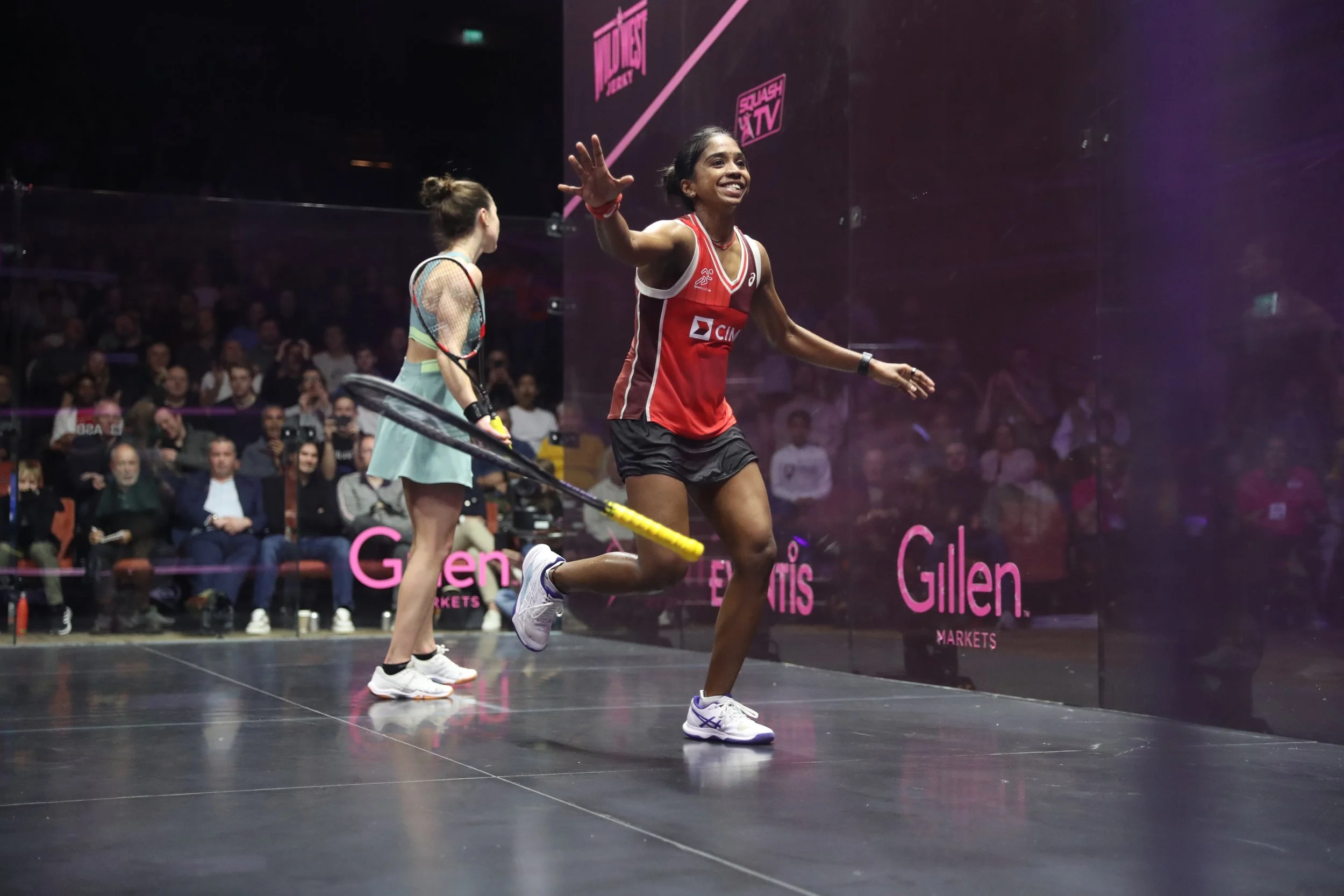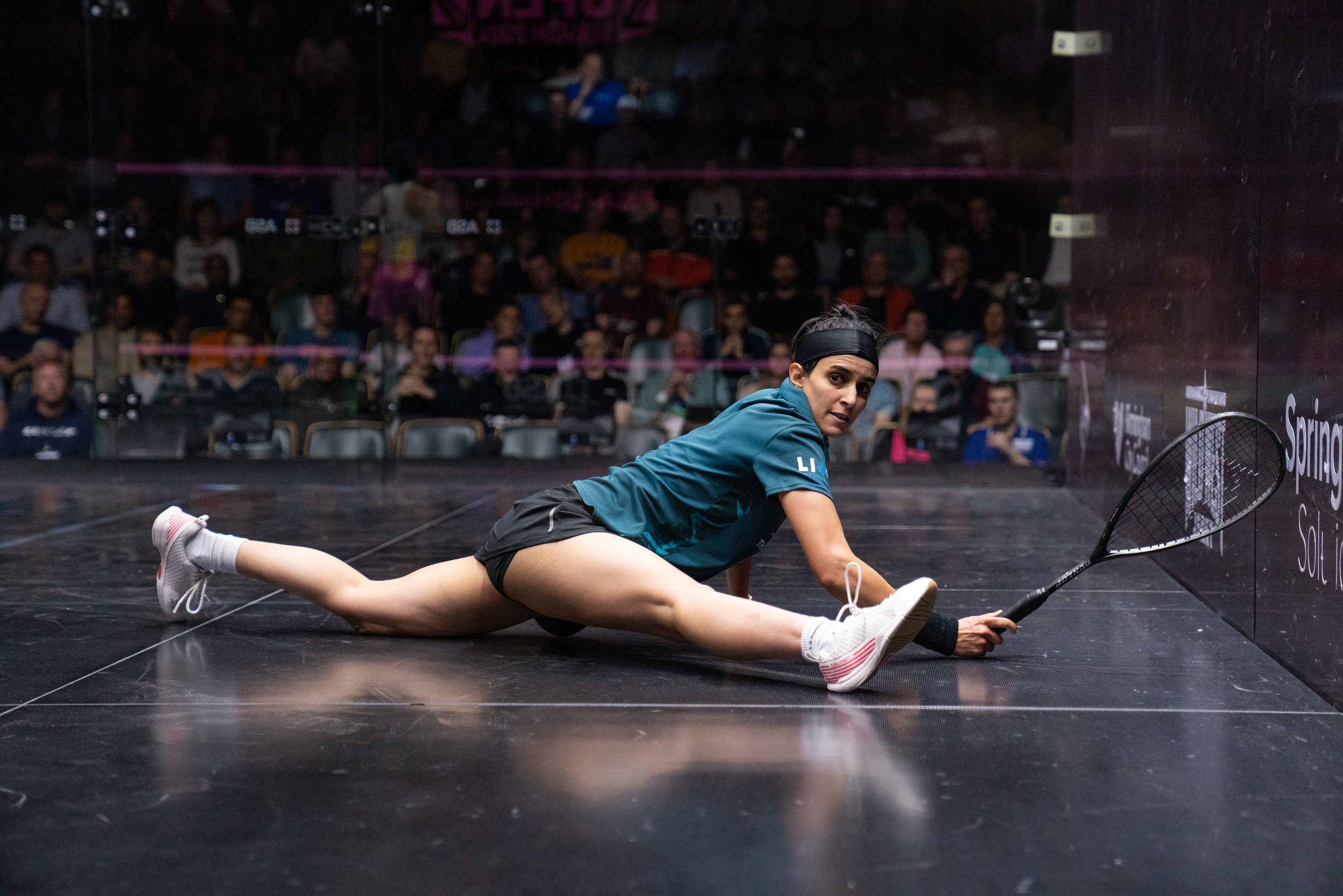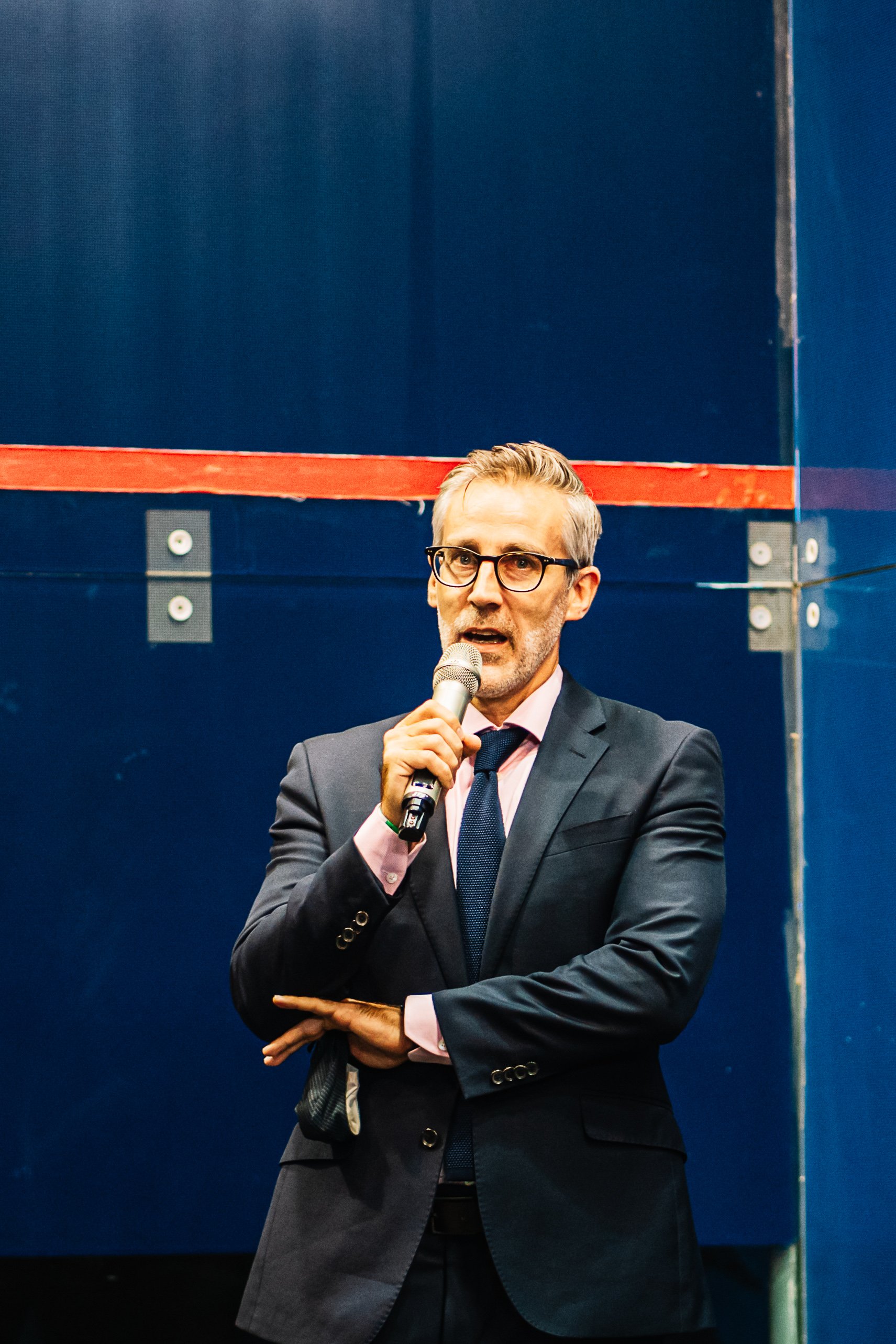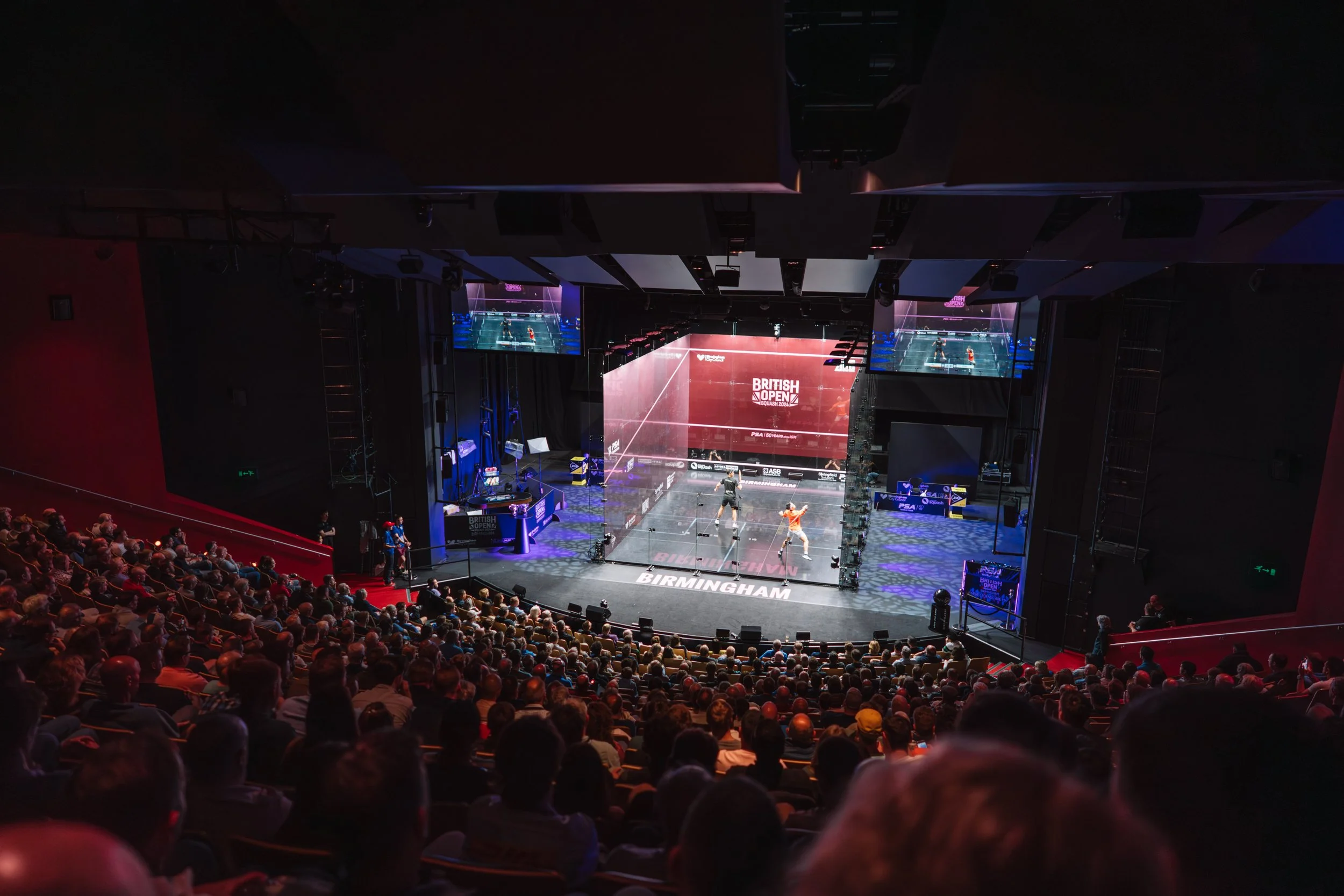THE FOCUS
Why squash’s leaders believe that being in the Olympics can be a game-changer – in a way that has obvious parallels with golf
We asked Alex Gough, chief executive of the Professional Squash Association, to outline his sport’s journey to Los Angeles in 2028 and explain how it can fuel future growth in participation

Some 20 million people, across 200 countries, enjoy playing squash. But the sport’s journey to the 2028 Olympics was littered with rejection.
In bid after bid, squash missed out as sports like BMX, skateboarding, and, yes, golf were welcomed into the Olympic family.
In October 2023, the news they had been waiting for finally arrived when squash was named as one of five new sports, alongside flag football, T20 cricket, lacrosse and baseball/softball, to be added to the timetable for the games in Los Angeles.
It finally ended a decade of disappointment.
While golf’s entry hasn’t always been plain sailing – governing bodies have often been more enthusiastic than some of the players over the last decade – the benefits for our game have still been profound.
Exposure on a global scale to audiences that might never otherwise see a player hitting a golf shot, a platform to showcase the sport at the ‘greatest show on turf’, and not to mention new funding streams, golf has gained with each games following its arrival at Rio in 2016.
For a sport that’s been obsessed in recent years with ‘growing the game’, you’d be hard pressed to find a better way to do that than as part of the Olympic movement.
Many of the same arguments apply equally to squash. So how did the racket sport secure its spot, what is the significance of the Olympics to this sport, and what might its impact be?

Alex Gough, chief executive of the Professional Squash Association, reveals just how big a game-changer it is to be in the four-yearly feast of sport. He also goes on to explain that staying in the five-ringed spectacular is not a formality and that to remain part of the show at Brisbane in 2032 they will need to prove their worth all over again.
This is a momentous time for squash…
Absolutely. It’s been a bit of a holy grail from a personal point of view since the mid-2000s but I think we’ve actually been trying to get in since before then. There have been a lot of ups and downs along the way.
But it always has been viewed by the sport as something that would make such a massive difference to squash.
What was the PSA’s role in the bid? How did they team up with World Squash and US Squash?
We worked very closely together, and the collaboration was very high among US Squash, World Squash and ourselves.
When we tried for the Paris 24 games, we involved French Squash and their president was Jacques Fontaine, who was also part of the French National Olympic Committee and PSA were in the middle of that bid as well.
It wasn’t very successful and we got usurped by breakdancing coming during partway through the bid as well. That bid didn’t even reach its conclusion.
But I guess the collaboration started then. Previously, we had been part of the conversations when we were trying to get into Tokyo and Rio, but it was slightly less structured. We were just asking for a bit of help here and there. We weren’t joined at the hip, which is what it felt like we were for this one.
Through all those rejections, how did you pick yourselves up and summon the enthusiasm for another bid?
All of us are ex-squash players and I think that resilience is quite high. When you’re involved in a sport in that second tier, and when I started out we were probably even as low as the third tier, you know you’ve got to just dig in, try as hard as you can and keep trying.
The really difficult part was that at each stage along the way we were essentially given different reasons for rejection each time. It was starting to become a feeling of, ‘the sport just doesn’t fit’.
Alongside that, you’ve also got the IOC pivoting and changing and trying to reinvent themselves. Rugby sevens and golf were the sports that got in for Rio in 2016 and after that there was a huge pivot towards youth. So you had two races going on. You had the 28 core sports that were in and then almost the testing ground of the IOC where they’ll work with the organising committee and try this sport and that sport.
They were all very much youth focused – skateboarding, surfacing, climbing. These sports came in. The slight issue at that point for squash was that as much as we’re trying to be innovative, and we’re a young sport, we’re still reasonably traditional.
It kind of felt like we should actually be in a race with badminton, table tennis and all those sports, when we ended up in a race with all the fun new stuff.
How do you innovate to widen the sport’s appeal? As far as the IOC may have been concerned, there is tennis, table tennis and badminton. Squash feels very much in that sector and BMX looks very different…
From the social media numbers that came out of Tokyo, skateboarding was pretty much top. They guaranteed becoming a core sport from there.
Our markets are slightly different. We’ve got a very big Egyptian contingent that are hugely successful and they’re also a nation that’s never historically done that well in the games.
You’ve got a completely different demographic of people than you would have for, say, badminton, tennis or table tennis.
That’s quite a big factor and then the growth within the US is really quite considerable. At the time of the bid there were four US women in the top 15. So you had a big push from the US and then a slightly different push from some of our markets.
We had to try and go down the route of the iconic locations we can play in. Without comparing ourselves to other sports, we can put a court in front of the great pyramids in Giza. We can put a court in Grand Central Terminal, in New York, on top of a building in China.
We really tried to go down the route of showcasing cities and being a cool sport you could almost have a bit of fun with.
How did you raise the funding?
It’s a really interesting point. I specifically remember the 2016 bid when it was ultimately golf and rugby sevens. We subsequently worked with an agency that had worked with rugby and I think they spent around four million euros on that bid.
I don’t know what golf spent but golf’s obviously in the realm of having a lot of cash at its disposal. World Squash would be less than a tenth of that at that point.
What happened for this LA bid – and this is what stood us in really good stead – was we were told there’s not going to be lobbying, there’s not going to be big expensive videos, and it was all pretty much behind closed doors.
It instantly levelled the playing field in terms of what we’d spent before. In all honesty, we barely spent anything. It was doing the questionnaires, on lots of Zoom calls.
There was a decent presentation put together but compared to previous bids where it had been lots of marketing on websites where people would spend gazillions of dollars to try and get into the Olympics, none of that happened for LA.
We’re up against flag football and, with the NFL leaning into that, we could have been totally eclipsed. But all credit to LA and the IOC. They’ve tried to make it more attainable and more efficient. They really don’t want cities going off and spending $20 to $30 million trying to get the games and that definitely made a big difference.
What is squash?
About
It’s a racket game that’s played in a four-walled court. It’s reported that some 20 million people play across the globe in close on 200 countries. Popular in the UK, with a well-defined club circuit, it is growing in popularity in the United States and, professionally, it has a strong presence in the Middle East.
Gameplay
Players take turns to strike a rubber ball against the front wall of the court. Three lines adorn that wall. These are the service line – at 1.78m high – the out line, which begins at 4.75m metres and slopes to 2.13m on the back wall, and the tin line, which is 43cm off the ground in elite games.
A point begins when the server hits the ball from one of two service boxes and it strikes the wall between the service line and the out line.
Shots can then be played off any of the four walls, but they must make contact with the front wall, between the tin and out line, before hitting the ground. The ball can only bounce once on the floor.
Scoring
Games are usually played to 11-points and the winner must win by at least two. Matches are usually a best-of-three or best-of-five games.
Court
The court measures 9.75m x 6.4m and the floor is hardwood. The walls in elite events are made of safety glass so spectators can watch.
What does the Olympics mean to squash?
When we made one of our first bids, Nicol David said she would trade it all – eight world championship medals – for an Olympic gold.
It’s not always the pinnacle for all sports, but it would absolutely be the pinnacle for squash. That is because of the level it’s at in terms of the amount of people that have never seen squash before that you’re potentially opening up to.
It is the biggest stage we could ever be on so, from an athlete and player perspective, it’s almost all they’re talking about. What’s the criteria? Will we be going? How do I qualify? It’s going to mean the world to a lot of players.
There’s a few knock-on effects. There is the interest, but the level will automatically go up as well. There’ll obviously be funding. There’ll be funding in countries.
That’s at different levels. Some will really lean into it, and it will be a huge priority. In other countries, it might be more tricky or there might just be more competition for that funding.
Now Paris is finished, the various federations and sporting bodies will be assigned certain amounts of cash to their elite programmes. You’d like to think everyone’s going to be trained, everyone’s going to have more support, everyone’s going to be training harder. The level of the sport itself will benefit and that will be quite a big spin off.
Are you seeing more interest in the sport?
We’ve got players across 80 countries now and tournaments across about 70. We saw almost an instant uplift – I want to say 20% - at the Challenger Tour level.
Everyone had a tough time through Covid but I think the smaller sports had an even tougher time. With squash, you’re next to somebody so you couldn’t play for ages. There was lots of talk that squash was going to struggle.
There was a certain negativity. Padel’s coming along and Pickle’s coming along and where does squash fit in with all of that? So to be able to say, ‘we’re are Olympic now’, it feels like it’s jumped us back to the front of that conversation again.
You’re an option sport now. What is being done to get into 2032?
We’re already very close to Squash Australia and we moved the Australian Open to Brisbane. Squash Australia are having lots of conversations with Brisbane 32 to try and get the relationship on a firm footing.
I don’t know whether this necessarily helps or not but, having been on the outside of everything for so long, you were always second guessing yourself from an IOC point of view. Should we do this? Should we do that? What are the things we need to do?
Where the IOC have been brilliant now is [that] suddenly squash is an Olympic sport and they want you to succeed. You’re in because they want you to be in.
You’re maximising those conversations and that relationship with the IOC while you’re preparing for LA. I think that will stand for quite a lot. Hopefully, they’ll get to know squash and what World Squash and PSA are about, what the tour is like and what the players are like.
They’re already sharing lots of social media from our events and World Squash’s events. You’d like to think that would build up a reasonable amount of momentum over the next few years so you’re viewed very much as an Olympic sport – as opposed to just a bit of a test.
“It felt like we should be in a race with badminton, table tennis and all those sports, when we actually ended up in a race with all the fun new stuff ”
Have you looked at other new sports in the Olympics and how they’ve been perceived? We’re thinking about golf, which has had a hugely positive response from governing bodies and a possibly less positive response from some players in the past…
Go back to when tennis got back in, from the tours’ point of view they never really viewed it - ‘the players won’t be that bothered. They won’t take it seriously’. That quickly turned the corner, didn’t it? Then as soon as the players became bothered about it, the sport became more bothered.
Certainly in Paris with golf, it felt like the players wanted to be there and they wanted to win. The IOC invited World Squash to go to Paris. They did an observation programme and they kindly invited me along with them.
We saw boxing at Roland Garros and basketball three-by-three, and table tennis, and badminton. Everyone was very accommodating and really open. ‘This is how it works. This is what you need to do. This is what you need to think about’ and how all the jigsaw pieces fit together.
The scale of it was one thing that really hit home. The broadcast side – OBS – scales up to 8,400 people to deliver the Olympics – just on the broadcast side of things.
We’ve already had our first conversation with OBS. They’re a massive factor in what the sport is going to look like and how it’s going to be presented. Some of those conversations, and there’s going to be quite a few, are going to be hugely important to us.
How will you take advantage of the opportunity of being in the Olympics?
We’re working quite hard in the background to further develop the court. That’s on a technical level.
Broadcast is massive. Wherever we end up and whoever all the relative rights holders are, say with someone like an NBC in the US, it would be great to start to get a relationship with them so by the time they come to show squash on their Olympic broadcasts they’re already super used to it. They’ve helped us develop.
Those conversations will need to happen in earnest so hopefully it won’t be the first time people have seen squash. If we can be on NBC a few times, Discovery Plus which has obviously got massive rights everywhere, and just keep pushing squash out there so people are actually looking forward to it in LA rather than just seeing it for the first time. That’s going to be pretty key for us.







